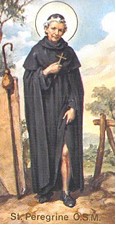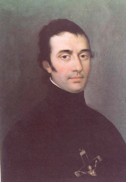Saints for May
 Saint Peregrine Laziosi
Saint Peregrine Laziosi
(1260-1345) May 1
Born in Forli, Italy, Peregrine is the patron saint of persons suffering from cancer, AIDS and other serious diseases.
As a young man he was a member of an anti-papal party until he encountered St. Philip Benizi, the head of the Servite order, who had been sent to try to reconcile the divided community. While trying to preach in Forli, Philip was heckled and even struck by Peregrine. But that moment also changed Peregrine. He began to change direction, engaged in good works, joined the Servites in Siena and went on to be ordained a priest. Returning to his home town, he became well known for his preaching and holiness as well as his devotion to the sick and poor.
A special penance he imposed on himself was standing whenever it was not necessary to sit. Over time, Peregrine developed varicose veins and, in turn, cancer of the foot. Because the wound did not respond to any medical treatment, amputation of the leg was proposed.
Tradition says that the night before the scheduled surgery, Peregrine spent much time in prayer before the crucified Jesus, asking God to heal him if it was God’s will. Falling asleep, Peregrine had a vision of the crucified Jesus leaving the cross and touching his cancerous leg. When Peregrine awoke, the wound was healed and his foot and leg, seemingly miraculously cured, were saved. He lived another 20 years. He died in 1345.
Saint Peregrine, teach us to discern your truth from our prejudices.
 Saint Pancras
Saint Pancras
(289-304) May 12
Saint Pancras is the patron of children because he was only fourteen years of age when he was martyred. He was born in 289 AD in Synnada, Phrygia, a kingdom in the west central part of Anatolia (modern Turkey). Much of what is recorded of him is apocryphal, but a martyr called Pancras was known to have been buried in the cemetery of Calepodius in Rome.
According to the legend, Pancras was orphaned, his mother Cyriada dying during childbirth, and his father Cleonius when he was eight. Pancras was entrusted to his uncle Dionysius’ care. They moved to Rome and, having come into contact with Christians in that city both converted to Christianity, Pancras becoming a zealous adherent of the religion.
During the persecution of Christians by Diocletian, around 303 AD, he was brought before the authorities and asked to perform a sacrifice to the Roman gods. Diocletian, impressed with the boy’s determination to resist, promised him wealth and power, but Pancras refused, and finally the emperor ordered him to be decapitated on the Via Aurelia, on May 12, 303 AD.
The Roman Emperor Diocletian was famous for mounting some of the fiercest persecutions of the early Church especially in the East of the Empire. Converting to Christianity during this period was highly dangerous and at the age Pancras announced his Christian faith publicly, he would have been seen as an example to others of his age.
Saint Pancras, preserve our children from the dangers of Godlessness in our modern society.
 Saint Eugene de Mazenod
Saint Eugene de Mazenod
(1782-1861) May 21
Saint Eugene de Mazenod was born to a wealthy family in 1782. At age eight, his family was forced by the French Revolution to flee the country. Political refugees, the Mazenod family trailed through Italy, where Eugene picked up an education and a liking for noble living. At age 20, he lost his title and his parents separated.
His natural concern for others, together with his faith fostered in Venice, made him deeply affected by the disastrous situation of the French Church. Despite opposition from his mother, he entered the seminary in Paris and was ordained in 1811.
Ignoring opposition from local clergy, he began his ministry caring for the truly spiritually needy – prisoners, youth, servants, country villagers. Soon other, equally zealous, priests joined him and they set out through the country, preaching, instructing, spending long hours in the confessional while sharing an intense community life of prayer, study and fellowship. In 1826, the Oblates of Mary Immaculate were sanctioned by the Pope. Eugene was elected Superior General and remained so for the rest of his life.
When the diocese of Marseilles was re-established, Eugene became auxiliary Bishop. The Oblates soon started to move out of France, preaching, baptising, caring. The two pivots of their founder’s living were love and zeal, and these he passed on to his men. In 1856, Napoleon III appointed him a Senator and at his death in 1861 he was the senior Bishop of France.
Saint Eugene, give us zeal in the service of God.
 Entries(RSS)
Entries(RSS)